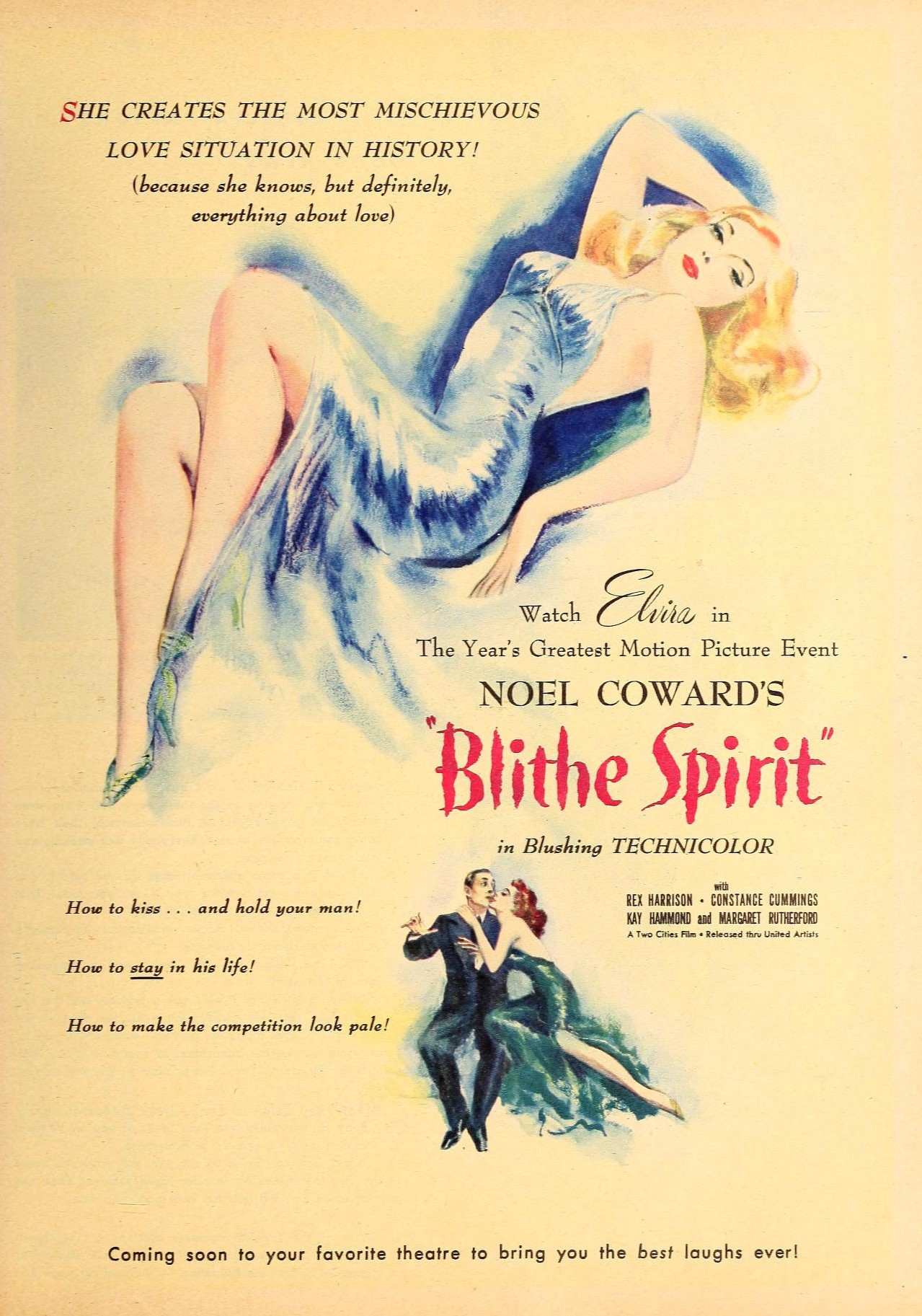

“Time is the reef upon which all our frail mystic ships are wrecked.”
Approaching Blithe Spirit from an auterist perspective is a fool’s errand. Though he would put his stamp on cinema history with his historical epics and, to a lesser extent, his Dickens adaptations, David Lean’s authorial voice in this early-career ghost story is almost nonexistent. Largely arranged and shot just like the stage play on which it is based, the only contributions from Lean that distinguish his work from Noël Coward’s black comedy drawing room drama amount to a few instances where he lets his characters take short car rides; or, in the case of Margaret Rutherford’s Madame Arcati, a bike ride. Presumably these short scenes were included to let us step out of the mansion for some fresh air on occasion.
Perhaps these meaningless insertions were the cause of Coward’s dislike of the film (which he produced and narrated). This surmise would seem sensible considering that the vast majority of the pleasure one can derive from the work is in its dialogistic antics and the physically comical performance from Margaret Rutherford. Though flippant in its humorous examination of conjugal love and fidelity, Coward’s witty chit-chat is a joy to behold and the backbone of the film, and it is in service of arranging tricky verbal hijinks around which the entire script revolves. Indeed, it is so reliant on them that even at a breezy ninety-six minutes the repetition starts to wear thin by the film’s end.
The story centers on an upper-class couple, Charles (Rex Harrison) and Ruth Condomine (Constance Cummings), both on their second marriages, harmoniously ensconced in their countryside mansion, who host a very peculiar dinner party one evening. Charles, a successful novelist whose posh lifestyle has sapped him of the creative spark, has arranged for the village outcast, the eccentric medium Madame Arcati (Rutherford), to conduct a séance with the hope that her spiritual charlatanism will provide him with a good punchline for his next mystery story. Neither the Condomines nor their guests, Dr. Bradman (Hugh Wakefield) and his wife Violet (Joyce Carey), believe in the occult, and so it is with complete amusement that they observe the utter sincerity with which Madame Arcati approaches her profession. She lights candles, breaks out a crystal ball, takes deep breaths, puts some music on the gramophone, marches around the room reciting the favorite nursery rhymes of her infantile spiritual guide, and eventually falls into a trance and lies flat on the floor. But then the table begins to shake beneath their joined hands, and Charles hears a disembodied voice inaudible to his companions. Spooked, he turns the lights back on and restores order. Except, he hasn’t: there in the room with them is his dead wife, Elvira (Kay Hammond), emanating a green Technicolor glow accented by her bright red lips and nails; an eldritch horror visible and audible only to him.

And so Charles Condomine finds himself in the most peculiar of love triangles, ruthlessly mined for all the humor it can deliver. The jokes come by repeatedly setting up parallel conversations wherein Charles’ perfectly appropriate replies to Elvira are vulgar and inappropriate in the context of his exchanges with Ruth. Ruth, already jealous of the crystalized image of Elvira that has lived on in Charles’ mind, becomes increasingly irritated as what she initially perceived as a silly lark, and then a spell of madness, becomes a grim reality: that her husband is falling under the spell of his domineering first wife, whose specter is indeed living in their home. Intrigued by the situation, Charles entertains the idea of having two doting wives to keep him company; one fleshly, one spectral. Of course, this fantasy assumes Ruth’s cooperation, which is unforthcoming even after the invisible Elvira has turned poltergeist to prove her existence (Tom Howard’s effects won him an Academy Award) and quickly turns to outright hostility.
Considering Lean’s workmanlike direction, Blithe Spirit is entirely reliant on its winsome cast. Particularly enlivening are Hammond and Rutherford, both of whom had originated the characters in the original run of the play. As Elvira, Hammond vamps on a single mischievous note, constantly fixing her lustful gaze on Charles and instigating trouble for him, and doing so while covered from head to toe in phosphorescent green paint. Rutherford, meanwhile, is a joy to watch as the indefatigable mystic. Coward’s script includes a fair number of brilliantly funny lines, but none that equal Rutherford’s daffy performance. Indeed, all of Madame Arcati’s ineffectual incantations are less a plot device than a platform for Rutherford to entertain the viewer with a masterful display of spirited physical comedy.
If Rutherford doesn’t quite elevate Blithe Spirit to classic status, her performance, the Technicolor presentation, and Coward’s zesty script are certainly enough to recommend it by.